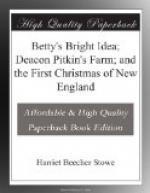[Decoration]
SCENE IV.
A freezing, bright, cold afternoon. “Cold as Christmas!” say cheery voices, as the crowds rush to and fro into shops and stores, and come out with hands full of presents.
“Yes, cold as Christmas,” says John Morley. “I should think so! Cold enough for a fellow that can’t get in anywhere—that nobody wants and nobody helps! I should think so.”
John had been trudging all day from point to point, only to hear the old story: times were hard, work was dull, nobody wanted him, and he felt morose and surly—out of humor with himself and with everybody else.
It is true that his misfortunes were from his own fault; but that consideration never makes a man a particle more patient or good-natured— indeed, it is an additional bitterness in his cup. John was an Englishman. When he first landed in New York from the old country, he had been wild and dissipated and given to drinking. But by his wife’s earnest entreaties he had been persuaded to sign the temperance pledge, and had gone on prosperously keeping it for a year. He had a good place and good wages, and all went well with him till in an evil hour he met some of his former boon-companions, and was induced to have a social evening with them.
In the first half hour of that evening were lost the fruits of the whole year’s self-denial and self-control. He was not only drunk that night, but he went off for a fortnight, and was drunk night after night, and came back to find that his master had discharged him in indignation. John thinks this over bitterly, as he thuds about in the cold and calls himself a fool.
Yet, if the truth must be confessed, John had not much “sense of sin,” so called. He looked on himself as an unfortunate and rather ill-used man, for had he not tried very hard to be good, and gone a great while against the stream of evil inclination? and now, just for one yielding, he was pitched out of place, and everybody was turned against him! He thought this was hard measure. Didn’t everybody hit wrong sometimes? Didn’t rich fellows have their wine, and drink a little too much now and then? Yet nobody was down on them.
“It’s only because I’m poor,” said John. “Poor folks’ sins are never pardoned. There’s my good wife—poor girl!” and John’s heart felt as if it were breaking, for he was an affectionate creature, and loved his wife and babies, and in his deepest consciousness he knew that he was the one at fault. We have heard much about the sufferings of the wives and children of men who are overtaken with drink; but what is not so well understood is the sufferings of the men themselves in their sober moments, when they feel that they are becoming a curse to all that are dearest to them. John’s very soul was wrung within him to think of the misery he had brought on his wife and children—the greater miseries that might be in store for them. He was faint of heart; he was tired; he had eaten nothing for hours, and on ahead he saw a drinking saloon. Why shouldn’t he go and take one good drink, and then pitch off a ferry-boat into the East River, and so end the whole miserable muddle of life altogether?




